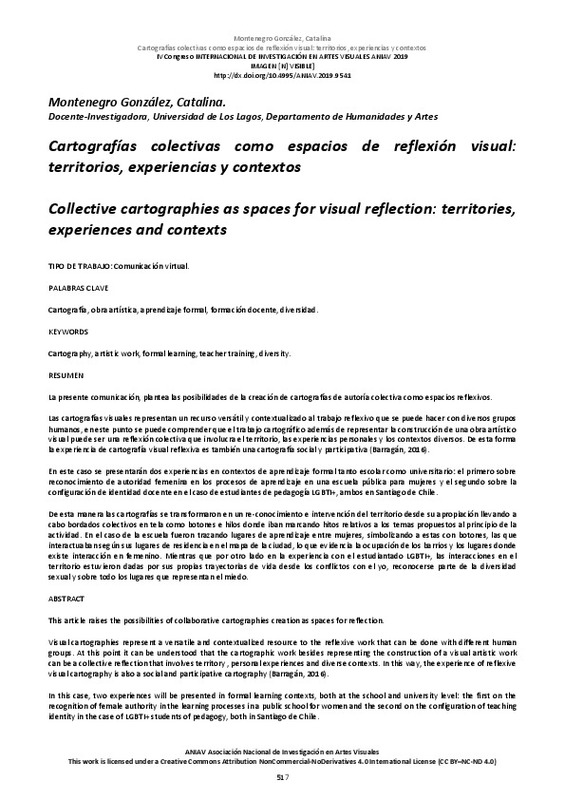JavaScript is disabled for your browser. Some features of this site may not work without it.
Buscar en RiuNet
Listar
Mi cuenta
Estadísticas
Ayuda RiuNet
Admin. UPV
Cartografías colectivas como espacios de reflexión visual: territorios, experiencias y contextos
Mostrar el registro sencillo del ítem
Ficheros en el ítem
| dc.contributor.author | Montenegro González, Catalina
|
es_ES |
| dc.date.accessioned | 2019-10-28T08:20:22Z | |
| dc.date.available | 2019-10-28T08:20:22Z | |
| dc.date.issued | 2019-09-10 | |
| dc.identifier.isbn | 9788490487662 | |
| dc.identifier.uri | http://hdl.handle.net/10251/129793 | |
| dc.description.abstract | [ES] La presente comunicación, plantea las posibilidades de la creación de cartografías de autoría colectiva como espacios reflexivos. Las cartografías visuales representan un recurso versátil y contextualizado al trabajo reflexivo que se puede hacer con diversos grupos humanos, en este punto se puede comprender que el trabajo cartográfico además de representar la construcción de una obra artístico visual puede ser una reflexión colectiva que involucra el territorio, las experiencias personales y los contextos diversos. De esta forma la experiencia de cartografía visual reflexiva es también una cartografía social y participativa (Barragán, 2016). En este caso se presentarán dos experiencias en contextos de aprendizaje formal tanto escolar como universitario: el primero sobre reconocimiento de autoridad femenina en los procesos de aprendizaje en una escuela pública para mujeres y el segundo sobre la configuración de identidad docente en el caso de estudiantes de pedagogía LGBTI+, ambos en Santiago de Chile. De esta manera las cartografías se transformaron en un re-conocimiento e intervención del territorio desde su apropiación llevando a cabo bordados colectivos en tela como botones e hilos donde iban marcando hitos relativos a los temas propuestos al principio de la actividad. En el caso de la escuela fueron trazando lugares de aprendizaje entre mujeres, simbolizando a estas con botones, las que interactuaban según sus lugares de residencia en el mapa de la ciudad, lo que evidencia la ocupación de los barrios y los lugares donde existe interacción en femenino. Mientras que por otro lado en la experiencia con el estudiantado LGBTI+, las interacciones en el territorio estuvieron dadas por sus propias trayectorias de vida desde los conflictos con el yo, reconocerse parte de la diversidad sexual y sobre todo los lugares que representan el miedo. | es_ES |
| dc.description.abstract | [EN] This article raises the possibilities of collaborative cartographies creation as spaces for reflection. Visual cartographies represent a versatile and contextualized resource to the reflexive work that can be done with different human groups. At this point it can be understood that the cartographic work besides representing the construction of a visual artistic work can be a collective reflection that involves territory , personal experiences and diverse contexts. In this way, the experience of reflexive visual cartography is also a social and participative cartography (Barragán, 2016). In this case, two experiences will be presented in formal learning contexts, both at the school and university level: the first on the recognition of female authority in the learning processes in a public school for women and the second on the configuration of teaching identity in the case of LGBTI+ students of pedagogy, both in Santiago de Chile. In this way, the cartographies were transformed into a re-knowledge and intervention of the territory from its appropriation, carrying out collective embroidery on canvas with buttons and threads that symbolize milestones related to the themes proposed at the beginning of the activity. In the case of the school, they traced places of learning among women, symbolizing these with buttons, which interacted according to their places of residence on the map of the city, which shows the students territorial distribution and those places where female interactions occur. While on the other hand in the experience with the LGBTI + student, the interactions in the territory were given by their own life trajectories from the conflicts with the self, recognizing as part of the sexual diversity and especially the places that cause them fear. | es_ES |
| dc.format.extent | 7 | es_ES |
| dc.language | Español | es_ES |
| dc.publisher | Editorial Universitat Politècnica de València | es_ES |
| dc.relation.ispartof | IV Congreso Internacional de investigación en artes visuales: ANIAV 2019 Imagen [N] visible | es_ES |
| dc.rights | Reconocimiento - No comercial - Sin obra derivada (by-nc-nd) | es_ES |
| dc.subject | Arte | es_ES |
| dc.subject | Producción artística | es_ES |
| dc.subject | Estética | es_ES |
| dc.subject | Teoría del arte | es_ES |
| dc.subject | Gestión cultural | es_ES |
| dc.subject | Educación artística | es_ES |
| dc.subject | Investigación artística | es_ES |
| dc.subject | Cartografía | es_ES |
| dc.subject | Obra artística | es_ES |
| dc.subject | Aprendizaje formal | es_ES |
| dc.subject | Formación docente | es_ES |
| dc.subject | Diversidad | es_ES |
| dc.title | Cartografías colectivas como espacios de reflexión visual: territorios, experiencias y contextos | es_ES |
| dc.title.alternative | Collective cartographies as spaces for visual reflection: territories, experiences and contexts | es_ES |
| dc.type | Capítulo de libro | es_ES |
| dc.type | Comunicación en congreso | es_ES |
| dc.identifier.doi | 10.4995/ANIAV.2019.2019.9541 | |
| dc.rights.accessRights | Abierto | es_ES |
| dc.description.bibliographicCitation | Montenegro González, C. (2019). Cartografías colectivas como espacios de reflexión visual: territorios, experiencias y contextos. En IV Congreso Internacional de investigación en artes visuales: ANIAV 2019 Imagen [N] visible. Editorial Universitat Politècnica de València. 517-523. https://doi.org/10.4995/ANIAV.2019.2019.9541 | es_ES |
| dc.description.accrualMethod | OCS | es_ES |
| dc.relation.conferencename | IV Congreso Internacional de Investigación en Artes Visuales. ANIAV 2019. Imagen [N] Visible | es_ES |
| dc.relation.conferencedate | Julio 03-05, 2019 | es_ES |
| dc.relation.conferenceplace | Valencia, Spain | es_ES |
| dc.relation.publisherversion | http://ocs.editorial.upv.es/index.php/ANIAV/ANIAV2019/paper/view/9541 | es_ES |
| dc.description.upvformatpinicio | 517 | es_ES |
| dc.description.upvformatpfin | 523 | es_ES |
| dc.type.version | info:eu-repo/semantics/publishedVersion | es_ES |
| dc.relation.pasarela | OCS\9541 | es_ES |








